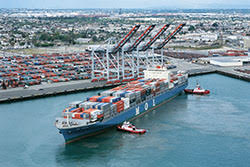Ransomware Infects LA Port and Causes Worries Concerning Security
 A cyber attack infected computers across Europe then spread to the United States and also managed to halt operations at the largest terminal of the Port of Los Angeles. Worries are rising that destructive actions undertaken by malware can cripple the critical supply chain.
A cyber attack infected computers across Europe then spread to the United States and also managed to halt operations at the largest terminal of the Port of Los Angeles. Worries are rising that destructive actions undertaken by malware can cripple the critical supply chain.
APM Terminals, the location where the Danish shipping carrier A.P. Moller-Maersk operates turned truckers away, the same as their locations in New Jersey, New York, and Rotterdam. Maersk's systems were down across different sites and business units due to a cyber attack, according to Concepcion Boo, a spokesman for the company. Maersk is working on assessing the situation at the terminals, trying to track down what is going on at all of the company business units.
Maersk is the world's largest carrier, accounting for 16% of the shipping fleet of the world used to transfer cargo around the globe.
The event sent shock waves across the supply chain, which has caused all parties to reevaluate their security, according to John McLaurin, the president of the Pacific Merchant Shipping Association. The group represents the terminal operators and owners.
Some parts of Europe and Ukraine were hit by a new strain of ransomware. The threat began to spread across the United States, affecting companies such as Merck and Mondelez International, Nabisco and Oreo. The malware is seen slowing down as time passes.
Officials for APM Terminals, owned by Maersk could not be reached for comment, but a spokesman for the port mentioned the company had shut down their normal operations at the terminal. There were no ships at berth at it, with none scheduled for two days. Trucking companies were warned and notified not to come to the terminal until the problem is fixed. Overall the operations have been minimally impacted.
Security concerns at the port
It is not entirely sure how widespread the attack was in the world's ports, but the intrusion showed there are grave concerns about the cybersecurity of the cargo hubs of the United States, such as Long Beach and Los Angeles, which provide the main gateway for Pacific Rim trade.
Roughly 90% of the goods of the world are shipped via ocean, so cyber experts expect that a severe outbreak may have serious effects on local trade all around the world. According to the CEO of CyberKeel, Lars Jensen, staying offline for too long has a ripple effect on the exporters and importers and that it impacts the entire supply chain all the way to the stores. If a shipping line goes down for a few hours, it is not a big deal, but it does become a problem if it goes on for prolonged periods, as it may have a ripple effect on stakeholders. Maersk can restore the data from scratch if necessary, which will go to show how ready they are for such cases.
There is a need for system modernization
That comes at a time when local ports in the US are trying to modernize the aging cargo tracking systems. International shippers are integral to US economy and that of Southern California as well. The idea is to make the data available to cargo movers, shippers, truckers, retailers and more.